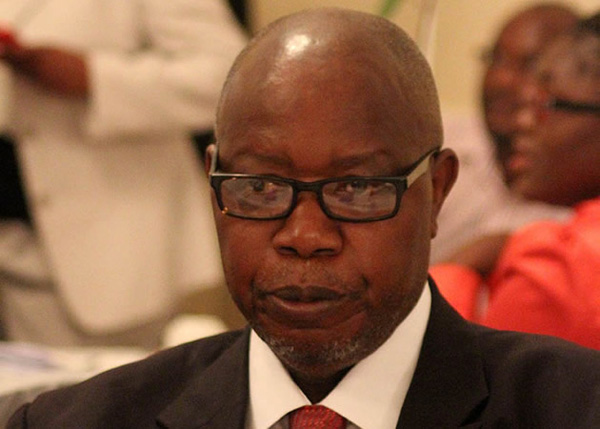
BY WINSTONE ANTONIO AWARD-WINNING journalist and media consultant, Geoffrey Nyarota, last week launched his third book titled The Honourable Minister, An Anatomy of Endemic Corruption at Royal Harare Golf Club. Nyarota is recognised mostly for his work as an investigative journalist.

His new book follows Against the Grain: Memoirs of a Zimbabwean Newsman published in 2006 and The Graceless Fall of Robert Mugabe in 2018.
NewsDay Life & Style senior reporter Winstone Antonio (ND) caught up with Nyarota (GN), who shared some insights of his latest book.
ND: You have just launched your third book, to what extent would you say your journalism experience has influenced your books? GN: My work as a journalist over many years has duly influenced the development of my career as an author over the past two decades.
This goes back to 2003 when I started writing my first title, Against the Grain. My writing style is influenced by my writing experience as a journalist.
More significantly, the content that I have packed into my three titles comprises my personal experiences and those more significant matters that I have encountered as an investigative journalist over the years.
Above all, the fact that I have worked many years as a newspaper editor means I have learnt to skilfully discipline my writing. This is crucial in handling the massive text that goes into the manuscript of a book.”
ND: Given that your last book was published in 2018, were you giving yourself time to dig into the issues raised in the book? GN: It is now four years since I finished writing the manuscript of The Graceless Fall of Robert Mugabe.
- Chamisa under fire over US$120K donation
- Mavhunga puts DeMbare into Chibuku quarterfinals
- Pension funds bet on Cabora Bassa oilfields
- Councils defy govt fire tender directive
Keep Reading
That is quite clearly a long stretch for a determined author to craft a manuscript of the length such as that of The Honourable Minister.
In fact, I regard this book as the outcome of hyper-activity on my part during the COVID-19 lockdown era. Because of the enforced limitation on movement, I had time to research, to be creative as well as to package the vast array of fascinating and provocative issues that I raise in the narrative.
ND: Concerns have been raised in certain circles, for instance, that The Graceless Fall of Mugabe scratched the surface of what actually transpired during the November 2017 coup which toppled the late former President Robert Mugabe and just rehashed what was already in the public domain. What is your comment? GN: That could be true to some extent, but that does not necessarily entail any weakness of the narrative. I was commissioned to write about the downfall of former Mugabe back in 2017.
In fact, I would be better placed to do justice to this question if I had an inkling of the identity of the “certain circles” that have raised the concerns that you refer to.
Let me start by explaining the circumstances in which the Graceless Fall was conceived. A fortnight after the fall of Mugabe, I was approached by Penguin Books. They pride themselves as “publisher of great writers and gifted storytellers, beloved books and eminent works.
Penguin had recently acquired Zebra Press of Cape Town, South Africa, publishers of my first literary work, Against the Grain in 2006, which I crafted while in the United States.
“Penguin had a specific commission for me. It was to produce a manuscript on the downfall of Mugabe and to do so within a certain period of time. They particularly wanted mine to be the first book to be published on the downfall of Mugabe.
They gave me a two-month deadline. There were obvious challenges attendant to this assignment. I accepted the challenge and submitted the requested manuscript two weeks after the deadline, accompanied by the catchy headline, The Graceless Fall of Robert Mugabe, in line with my theory that if was First Lady Grace Mugabe, who ultimately caused the downfall of her aged husband.
There was a limit to the amount of research that I could conduct in two months. I wasted much time while seeking to interview the Mugabes in vain.
“Penguin was happy when I submitted my manuscript. I had done my best in the circumstances to satisfy the expectations of my publisher.
One problem with these “certain circles” that you refer to is that they never offer alternatives. In the four years since they declared Graceless
Fall as being inadequate in their opinion, they have not, for the benefit of the reading public, delved more deeply into the issues that they raise and written any books.
“It would appear that they are more expert at denigrating what others write, not at constructing alternative narratives.”
ND: Corruption has become endemic in Zimbabwe over many years. Do you believe books of this nature can compel government and political actors to do soul-searching and change their behaviour? GN: Since my days as editor of The Chronicle in the 1980s I have held the belief that corruption has flourished because the media did not rise to the challenge of taking up the cudgels to fight it.
It is my fervent hope, therefore, that The Honourable Minister will have a positive or deterrent impact on those of our politicians who are of a relentlessly corrupt disposition.
I believe that our authors should write more books that challenge corruption. If this kind of narrative fails to appeal to the collective conscience of the corrupt, then nothing will ever cause them to engage in any soul-searching.
If those whom you describe as political fatcats see nothing wrong with parking a fleet of cars in the garage and routinely spoiling themselves with chunks of beef, pork and chicken, while those who vote for them survive on the so-called tutsaona, that means that we are doomed.
ND: What kind of challenges, if any, did you face during research and writing the book? GN: Because this book is a work of fiction which is based on reality, one major challenge was to present truthful events in a manner that does not easily prompt certain living persons to believe that they are the targets.
In fact, one of the joys of reading The Honourable Minister, will be the constant effort to guess which of our politicians over the years are being referred to in the various instances.
It was both a challenge and a joy for me to ensure that no reader ever succeeds in associating my clearly corrupt characters with any allegedly corrupt living politicians over the years.
ND: Zimbabweans are generally said to have a poor reading culture. Do you think that can negatively impact the influence such a book might have had? GN: The level of consumption of literary content among Zimbabweans depends on the nature or quality of the literature that the reading public is offered by authors.
Books are rather like newspapers; some sell, others do not. The level of a reading culture also depends on how the media present or portray new publications to the reading public.
It is my view that our book reviews tend to be too negative, if not outright hostile on occasion, as if motivated by malice. Some reviews appear to be calculated to keep readers away from buying or reading certain books.
The first published review of my Against the Grain was written, rather surprisingly, by Jonathan Moyo (former Information minister in the Mugabe government). The review was extremely and maliciously negative. It was a hardly concealed settling of personal scores with the author.
As I pointed out, Moyo’s review of Against the Grain must have been the very first review in the history of book publishing to be crafted by one of the major villains of the plot.
Errors are an integral part of any human endeavour, but it is not as if some authors set out with a determination to make mistakes. I have read many book reviews that are too negative to promote a healthy reading culture.
As a result, bestsellers in Zimbabwe are in the region of a few thousand copies, while Things Fall Apart by Nigerian author Chinua Achebe sold more than a million copies. I believe that with proper marketing Zimbabweans can achieve much higher levels of sales to engender a healthier reading culture.”
ND: Piracy has continued to rip authors off their well-deserved earnings. What do you think should be done to counteract such sabotage and the best way to market books? GN: Book piracy is described as an illegal and illegitimate reproduction of other people’s intellectual property for economic reasons without prior consent or authorisation.
It is unfair that after lengthy periods of time are invested in creating content for a manuscript for a book and large sums of money are invested in publishing and printing such literary works, pirates, who are nothing, but common thieves, should seek to reap where they did not sow.
Copyright authorities should introduce stern measures that effectively prevent piracy of music and literary content.”
ND: Now that you have launched your third book, in what way would you say writing has changed the way you see yourself? GN: I have been a published writer going back to 1978. Writing has become part of my DNA for many years.
Unfortunately, my kind of writing has a propensity to create powerful enemies for me. But it is gratifying to note that the enemies are grossly outnumbered by friends, who tend to be powerless, however.
ND: Which writers have influenced you the most? GN: I have been influenced by Chinua Achebe, especially his Things Fall Apart, which was my Ordinary Level prescribed Literature in English book.
In writing The Honourable Minister I was influenced especially by George Orwell’s Animal Farm. Orwell was able to look into the future, as it were, and was able to forecast the future of our independent nations.
Orwell’s future is the present that I now graphically seek to capture in The Honourable Minister.
I have also been influenced tremendously by Bob Woodward and Carl Bernstein, the two Washington Post reporters who investigated the world-famous Watergate Scandal which led to the resignation of President Richard Nixon in the United States in 1974.
The two journalists became highly successful authors thereafter. Woodward has written 24 books thereafter while Bernstein published six. Their collaboration, All the President’s Men, the narrative of how they conducted the investigation that exposed Nixon is inspirational.”
ND: What are your thoughts concerning the current state of Zimbabwean literature? GN: I believe that while we have excellent writers in Zimbabwe currently, people such as Tsitsi Dangarembga, Petina Gappah and up-and-coming fiction writer Benjamin Sibanda a lot of potential remains untapped and therefore, unexploited.
“I single out Dangarembga and Sibanda as writers in the forefront of the fight against corruption. It is, however, a disheartening realisation that there is a large number of budding writers, many of them youngsters who are anxious for a breakthrough, but are denied the opportunity.
“Many budding writers have ideas with potential to become good books. Publishers are not too keen to invest in projects that will not generate sales. So, they are cautious.
“It’s a Catch 22 situation. Over the years I have received many requests for assistance. While I am keen to assist, I have my own limitations.
The Honourable Minister is the first book published by my own recently established publishing company, Chiedza Books.
The project will focus on working with new writers seeking to be published authors, that is apart from seeking to expand the horizons of Zimbabwean literature.”
ND: Going forward, are we likely to see more books from you? GN: Yes, most certainly. In fact, my forthcoming fourth title, The Journalist as an Outcast, Consequences of Investigative Journalism, has been a long way coming.
“I realised that I wrote my personal memoir Against the Grain somewhat prematurely. So, I offer The Journalist as an Outcast as my second memoir, which covers a rather dreadful period of my career as a journalist.
“I have been working on this manuscript on and off for eight years now. Meanwhile, while I wrote Against the Grain mainly for the Zimbabwean market, it was published in South Africa.
“It was never sold in Zimbabwe. We are now working on preparations for a second edition of the book. It will soon be published in Harare for the Zimbabwean market.”











